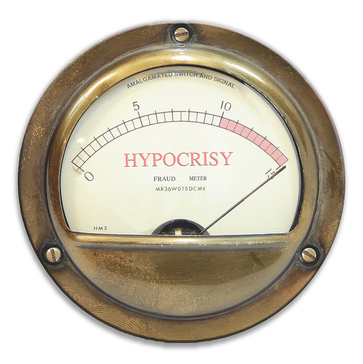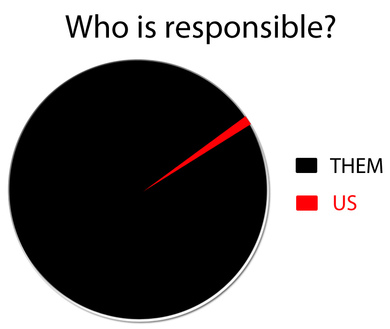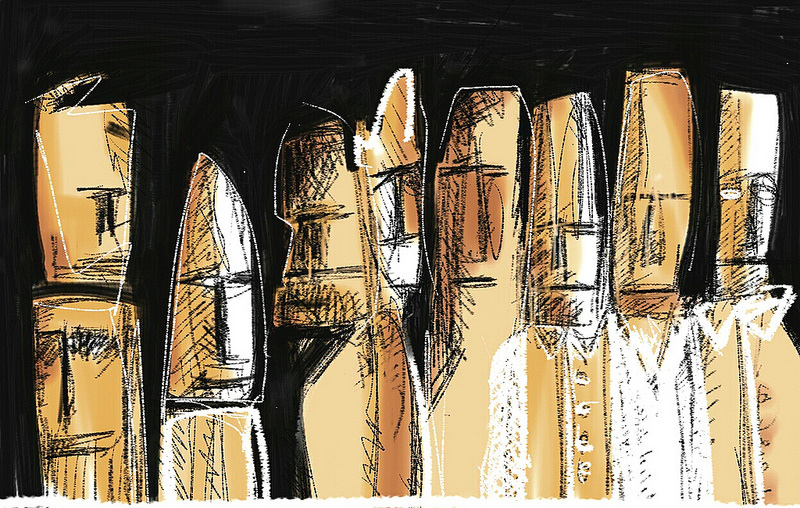Between Stockholm Syndrome and Lima Syndrome
Part 52: The Power of Propaganda and Thanataphobia

The power of propaganda.
Oxford Dictionary defines propaganda unflatteringly as "chiefly derogatory information, especially of a biased or misleading nature, used to promote or publicize a particular political cause or point of view." Historically, fascist and totalitarian regimes—from Hitler to Stalin, from Franco to Tojo, from Mao to Suharto, from Mugabe to Kim Jong-un—had embraced propaganda as an indispensable tool to consolidate and legitimize their political power. It's only natural that in the 21st-century we tend to think that propaganda is exclusively utilized within the domain of political science.
Nothing could be further from the truth, because the place of propaganda in religion is actually as central if not more so. As cited in Part 25 (What If Adam had not Eaten an Apple?) the word propaganda derived from an office created by the Catholic Church (Pope Gregory XV) in 1622 called the Congregatio de Propaganda Fide (Congregation for Propagating the Faith) to suppress the reformation movement. The principles of propaganda, whether applied in the realms of politics or religion, remain the same.
As a matter of fact, it's interesting to observe the similarities between how propaganda flourishes both in politics and religion.
First, almost all propaganda is designed to create fear. As observed by English author and social commentator John Boynton Priestley (1894-1984), heads of governments know too well that fearful citizens are more obedient, easier to govern, will forfeit rights they would otherwise defend, and are less likely to demand a better life. Cult leaders have realized this phenomenon and strategically exploited the fear of their followers for blind loyalty, unquestionable devotion, and more Rolls Royces.
Understand the psychology of thanatophobia, add the inevitable death into the equation, promise believers with eternal salvation and paradise with nineteen virgins, then you'll get the picture. Since most organized religions have claimed different explanations about the afterlife, heaven and hell, it is only natural that most believers have developed a severe case of thanatophobia, which is defined by Webster dictionary as an abnormally great fear of death.
Second, propaganda draws strength and nourishment from a common enemy. In fact, without an enemy, propaganda loses its steam in next to no time. No enemies? No problem. Just create new enemies or scapegoats or boogeymen—real or perceived. While for Hitler it was the Jews, for Stalin it was the counter-revolutionaries. While for Mao it was the reactionaries, for Islamic fundamentalism it is Western lifestyle and education. While for Shiite theocratic rulers in Iran the enemy is the Sunnis, for Sunni theocratic rulers in Saudi Arabia the enemy is the Shiites. After all how would one explain the 1,400-year bloody sectarian violence between the two denominations that is still going on up to date?
Then if it seems as if the 1,400-year sectarian violence is an exercise in futility, it is. Social philosopher Eric Hoffer (1898-1983) explained this phenomenon in The True Believer: Thoughts on the Nature of Mass Movements (1951): "propaganda ... serves more to justify ourselves than to convince others; and the more reason we have to feel guilty, the more fervent our propaganda." After 1,400 years of violence, how many Sunnis have ever been converted into Shiites (and vice versa) anyway?
Third, and this is the most amazing part in my humble opinion, propaganda miraculously converts suicidal inferiority complex into chauvinistic superiority complex. This is by far propaganda's biggest bang for the buck. To compensate for blind loyalty and irrational sacrifices offered unconditionally to a despot, cult leader or holy cause, obedient followers are made to believe in their own superiority and holier-than-thou piety.
As explained by English writer and philosopher Aldous Huxley (1894-1963) in Writers and Readers: The Olive Tree and Other Essays (1936): "Dictatorial propaganda demands obedience and even considerable financial and other sacrifices; but by way of compensation it assures the individual that, as a member of a chosen nation, race, or class, he is superior to all other individuals in the world; it dissipates his sense of personal inferiority by investing him with the vicarious glory of the community; it gives him reasons for thinking well of himself; it provides him with enemies whom he may blame for his own short-comings and upon whom he may vent his latent brutality and love of bullying."
Thanatophobia. Blind loyalty of the bullies, by the bullies, and for the bullies. Custom-made common enemies or scapegoats to consolidate power. Inferiority complex coupled with holier-than-thou piety. Those are the building blocks of the propaganda ecosystem that have been effectively used by despots, cult leaders, theocratic rulers, Boko Haram and Islamic State.
[To be continued.]
Johannes Tan, Indonesian Translator & Conference Interpreter










 RSS Feed
RSS Feed